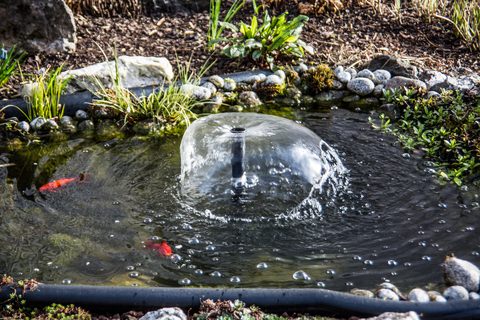| Back to Back Issues Page |
 |
|
The Goldfish Gazette, Issue #092 Pond Water Health August 30, 2021 |
Goldfish Care TipsA Free Monthly Resource For Goldfish Enthusiasts In This Issue Pond water health needs to be monitored just as closely as aquarium water health, in fact more so because ponds are exposed to environmental extremes that aquariums aren’t. Pond Water Health
Environmental ChallengesA pond is usually exposed to the elements, so there can be massive swings in temperatures across the seasons.Dead organic matter that finds its way into the pond such as leaves, aquatic plants, small animals, down to single cell algae and bacteria all have an influence on water quality and oxygen levels. A combination of high water temperature and lots of dead organic matter in a pond usually leads to at best, an algal bloom, at worst, loss of fish from an ammonia spike, low oxygen levels or both. Climate change isn’t helping either, causing either flash flooding or water shortages. In my own Country I have noticed in winter my ponds need topping up where in the recent past, winter rain could be relied upon to regularly flush the ponds. We now have water restrictions that are affecting how often I do water changes. Simple Bio-load Reducing PracticesYou should be monitoring your water quality regularly using a cheap water test kit such as an API Freshwater Master Test Kit.The same water parameters apply to a pond as they do an aquarium, pH around 7-7.4, nitrates below 30 ppm (parts per million), ammonia and nitrites zero. If you are running a filter, ammonia and nitrite levels should never be a problem, but it doesn’t hurt to keep the bio-load as low as possible, especially during summer. Always remove any dead organic matter such as leaf litter or dead and dying aquatic plants as they are noticed. If left, they fall to the bottom to be broken down by anaerobic bacteria that produce hydrogen sulfide. Make seasonal changes to feeding. Late spring and early autumn should be the seasons of heaviest feeding. Summer is the peak growth season, but the feeding level will depend on the condition of your water. If it is pea soup green, you have a problem that needs to be corrected before loading up the eco-system further with fish food. If winter water temperatures are below 10oC (50oF), Goldfish usually show little interest in food, so all feeding should stop. If rainfall isn’t flushing your pond regularly, and water testing is showing a drop in water quality, the easiest way to restore water parameters are partial water changes. This is also a good opportunity to siphon off the sludge at the bottom of the pond. Pond AerationIf you aren’t running a filter, a very beneficial addition to any pond is aeration.Dissolved oxygen levels below 3 ppm can either kill fish outright, or cause enough stress so the fish contract a disease. Oxygen depletion is the most common cause of fish deaths in ponds. Don’t forget, algae and aquatic plants absorb oxygen on cloudy days and at night. Seasonal die-offs of phytoplankton (algae), aquatic plants or a build-up of other dead organic matter can cause an aerobic bacterial population explosion that uses more oxygen from the water while breaking down the dead organic matter. In deep ponds, as the water heats up during spring the water becomes layered. Warm oxygen rich water is on the top, cold oxygen depleted water is at the bottom. If the warm water is suddenly cooled by rain, the two layers will mix, causing the overall oxygen level to fall to a dangerous level. Aeration solves all these problems by ensuring the pond water is always oxygen rich. If you think pond aeration is worth considering, Amazon have a good selection of aerators available.
Comments? Ideas? Feedback? I'd love to hear from you. Just reply to this e-zine and tell me what you think, or what topics you want covered. Next Month's Topic Water Change Toolswww.facebook.com/aboutgoldfish |
| Back to Back Issues Page |
